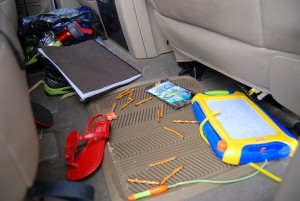 If your family are anything like mine, more often than not the inside of your car will look more like a semi full skip after a house clearance rather than a clean, tidy and comfortable method of transport. Crisp wrappers litter the glove box, sticky sweets and crumbs can be found lurking between seats and half empty drink bottles roll aimlessly around in the foot wells. Add to this the smell of sweaty sneakers that have been in the trunk for the past six months, and travelling anywhere of any length of time suddenly becomes more health hazard than relaxing getaway.
If your family are anything like mine, more often than not the inside of your car will look more like a semi full skip after a house clearance rather than a clean, tidy and comfortable method of transport. Crisp wrappers litter the glove box, sticky sweets and crumbs can be found lurking between seats and half empty drink bottles roll aimlessly around in the foot wells. Add to this the smell of sweaty sneakers that have been in the trunk for the past six months, and travelling anywhere of any length of time suddenly becomes more health hazard than relaxing getaway.
School holidays tend to be the worst time. When the car is regularly taken to the pool, the park and the beach. No matter how hard I try, most of the beach seems to travel home with us including a couple of buckets of semi dead marine life that my daughter thought she could resuscitate once home. Needless to say they didn’t make the journey!
It doesn’t have to be this way. It is possible to create a clean, mean driving machine with very little effort and just a bit of organisation. In fact it’s almost as easy to get your car kiddie friendly, as it is to compare australian car insurance! Here are our top 5 secrets for doing just that:
1. Get organised and start as you mean to go on
The very first step to dirty car rehabilitation is to just get stuck in there and spend a couple of hours removing EVERYTHING from the interior that isn’t firmly attached, or part of the car itself. This includes car seats, floor mats, cushions, blankets and cuddly toys. Once empty, spend time cleaning the car from top to bottom remembering to vacuum between seats, clean sticky handprints from windows and check the roof and seat fabric for stains or marks. Replace car seats and in-car essentials tidily into the vehicle and throw everything else into the trash.
This is now the blueprint from which you should work. Remember this moment, and how good it feels!
If they’re old enough, show your children the new and improved car and explain to them that this is the standard you expect it to be from now on, explaining that it’s everyone’s responsibility to keep it this way.
2. Invest in a hand-held rechargeable vacuum cleaner
A small hand-held vacuum cleaner is likely to become your new best friend, and should be given a special home in your garage or shed (pick the closest place to where you park your car that has an electric point for charging) ready to whip out following any journey that involved crumbs, mud or sand.
Try to get into the habit of giving the car a very quick once over after every couple of journeys, and you’ll be amazed at how long the car stays fresh and clean. Consider incentivising an older child to do this as one of their chores.
3. Keep a stash of wipes and tissues in your glove compartment
If you already have children, I won’t need to explain how essential a ready supply of moist wipes and tissues is. From wiping up sticky hands to cleaning muddy shoes before they enter the car, you must NEVER be without these!
4. Become a bag lady
Before any journey of longer than an hour or so, remember to take a few disposable plastic or paper bags with you. Crucial for easy disposal of litter, but can also double up as a makeshift laundry bag for soiled or wet clothes.
5. Store in car entertainment in plastic containers
Keep your children’s favourite CD’s, DVD’s, reading books and games in plastic containers that can be stored in the boot or under seats. Encourage your children to replace everything into their box after each journey, and add little surprises to each child box before each journey – like a new colouring book or set of pens. Not only will your car remain spick and span, long journeys become a source of excitement rather than one long chore.

 Watching Dr Phil the other day I listened to how a girl was out drinking with a group of “so called friends” boys, they all got drunk and she was gang raped.
Watching Dr Phil the other day I listened to how a girl was out drinking with a group of “so called friends” boys, they all got drunk and she was gang raped. Bunnings have quiet a few children’s activity classes for kids over the age of 5 and you must accompany them. It would be worth checking out your nearest store for their times and taking your child along to make something for their mum. You can see
Bunnings have quiet a few children’s activity classes for kids over the age of 5 and you must accompany them. It would be worth checking out your nearest store for their times and taking your child along to make something for their mum. You can see  There’s no doubt the Fly In Fly Out lifestyle is tough on the families of mining workers. Ever since the 1980’s, Australian gas, oil and mining operation staff are required to fly out to remote locations to work ten to fourteen hour shifts for two to six weeks at a time. While the financial gains from this type of work are generous, the long term effects on individuals, couples and especially families are difficult to ignore.
There’s no doubt the Fly In Fly Out lifestyle is tough on the families of mining workers. Ever since the 1980’s, Australian gas, oil and mining operation staff are required to fly out to remote locations to work ten to fourteen hour shifts for two to six weeks at a time. While the financial gains from this type of work are generous, the long term effects on individuals, couples and especially families are difficult to ignore.
 Every parent wants to do a good job raising their kids.
Every parent wants to do a good job raising their kids. I have been a separated dad for over 25 years, twice over. Its something I am not proud of but I am proud of being a good dad. I have had two very different experiences. My first child was every second weekend, I did everything I could to be in her life – as much as I was allowed or welcomed.
I have been a separated dad for over 25 years, twice over. Its something I am not proud of but I am proud of being a good dad. I have had two very different experiences. My first child was every second weekend, I did everything I could to be in her life – as much as I was allowed or welcomed. People often associate negotiations with deals between companies or purchases but in reality, the average person makes dozens of negotiations every single day. Whether it’s discussion with an (ex)spouse, pleading with children, or coming to a consensus on dinner plans with friends – negotiating is a part of everyday life. While everyone inevitably engages in some form of negotiation, not everyone is skilled at it. Luckily, it doesn’t require years of business classes to become a great negotiator. And the benefits of becoming a great communicator can be tremendous. Keep the following things in mind for future negotiations.
People often associate negotiations with deals between companies or purchases but in reality, the average person makes dozens of negotiations every single day. Whether it’s discussion with an (ex)spouse, pleading with children, or coming to a consensus on dinner plans with friends – negotiating is a part of everyday life. While everyone inevitably engages in some form of negotiation, not everyone is skilled at it. Luckily, it doesn’t require years of business classes to become a great negotiator. And the benefits of becoming a great communicator can be tremendous. Keep the following things in mind for future negotiations. Getting your first part time job is a proud moment in anyone’s life, and this will be no different for your teen.
Getting your first part time job is a proud moment in anyone’s life, and this will be no different for your teen. News gleaned from the TV, radio, or Internet can be a positive educational experience for kids. But when the images presented are violent or the stories touch on disturbing topics, problems can arise.
News gleaned from the TV, radio, or Internet can be a positive educational experience for kids. But when the images presented are violent or the stories touch on disturbing topics, problems can arise. Having a teenager can be a difficult time, and being one can be even harder. It’s a strange time in their life as they aren’t a kid anymore, but they still rely on people to assist them with decision making. There has been an increase of teenagers joining the workforce in recent years, and the idea of letting adolescents work has been a heavy debate for years. If you and your teenager are trying to decide if getting a part time job is right for their path, there are a few things to consider:
Having a teenager can be a difficult time, and being one can be even harder. It’s a strange time in their life as they aren’t a kid anymore, but they still rely on people to assist them with decision making. There has been an increase of teenagers joining the workforce in recent years, and the idea of letting adolescents work has been a heavy debate for years. If you and your teenager are trying to decide if getting a part time job is right for their path, there are a few things to consider: There was one thing I was looking forward to when I had my first kid. It wasn’t spending time raising someone to be responsible, nor was it having a new best friend to laugh and play with. It was finally getting someone else to mow the lawn for me. No more of my weekend time wasted pushing my lawnmower with the busted automatic drive, no more time fixing the bag that keeps falling off, and no more hauling the grass bags off to the bin. That is all Dennis Junior’s job.
There was one thing I was looking forward to when I had my first kid. It wasn’t spending time raising someone to be responsible, nor was it having a new best friend to laugh and play with. It was finally getting someone else to mow the lawn for me. No more of my weekend time wasted pushing my lawnmower with the busted automatic drive, no more time fixing the bag that keeps falling off, and no more hauling the grass bags off to the bin. That is all Dennis Junior’s job.
















Recent comments